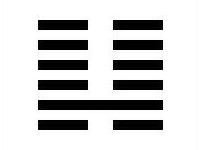
I Ching Hexagram 7 - Shih / The Army

- Above K'un the Receptive, Earth
- Below K'an the abysmal, Water
Introduction
This hexagram is made up of the trigrams K'an, water, and K'un, earth, and thus it symbolizes the ground water stored up in the earth. In the same way military strength is stored up in the mass of the people--invisible in times of peace but always ready for use as a source of power. The attributes of the two trig rams are danger inside and obedience must prevail outside. Of the individual lines, the one that controls the hexagram is the strong nine in the second place, to which the other lines, all yielding, are subordinate. This line indicates a commander, because it stands in the middle of one of the two trigrams. But since it is in the lower rather than the upper trigram, it represents not the ruler but the efficient general, who maintains obedience in the army by his authority.
See the James Legge translation of this hexagram.
<-Prev Next->Judgement
The Army. The army needs perseverance And a strong man. Good fortune without blame.
Judgement Commentary
An army is a mass that needs organization in order to become a fighting force. Without strict discipline nothing can be accomplished, but this discipline must not be achieved by force. It requires a strong man who captures the hearts of the people and awakens their enthusiasm. In order that he may develop his abilities he needs the complete confidence of his ruler, who must entrust him with full responsibility as long as the war lasts. But war is always a dangerous thing and brings with it destruction and devastation. Therefore it should not be resorted to rashly but, like a poisonous drug, should be used as a last recourse.
The Image
In the middle of the earth is water: The image of The Army. Thus the superior man increases his masses By generosity toward the people.
The Lines
Six at the beginning means: An army must set forth in proper order. If the order is not good, misfortune threatens.
Changing only this line creates Hexagram 19 - Lin / Approach or initial success followed by retreat and misfortune. This line shows how a good beginning begat's a good end and likewise inattention to initial conditions lays the seed for future failure. Legge shows that the rules of war must be righteous and the cause right for success to be certain "...the war be for a righteous end; and second, that the manner of conducting it, especially at the outset, be right." This line is indicating a deficit in both so eventual failure is almost certain.
Nine in the second place means: In the midst of the army. Good fortune. No blame. The king bestows a triple decoration.
Changing only this line creates Hexagram 2 - K'un / The Receptive or the Earth and its augury of sublime success. This line seems to be saying that a successful army leadership must follow the direction of its sovereign and not seek to take over power for itself. If this is done great rewards will be earned by the army and its members. Legge states "...line 2 comes to be the symbol of the general in command of the army" with all the responsibility and kudos that entails.
Six in the third place means: Perchance the army carries corpses in the wagon. Misfortune.
Changing only this line creates Hexagram 46 - Sheng / Pushing Upward is a positive hexagram, showing how persist ant effort can be rewarded by success yet the line itself seems quite negative. An army of corpses is a failed army so this line is not a pleasant one to receive. Legge says "...shows how the host(army) may, possibly, have many inefficient leaders. There will be evil..." so again not a good situation. Perhaps this evil can be undone by following the prescription for action described in the resultant hexagram Sheng "...pushing upward is made possible not by violence but by modesty and adaptability."
Six in the fourth place means: The army retreats. No blame.
Changing only this line creates Hexagram 40 - Hsieh / Deliverance or release of tension and in this context this indicates a retreat in the face of superior forces. This would certainly relieve soldiers tensions! Legge finds no blame or error in this retreat as it preserves the army for service at a future more auspicious time "...the retreat will be right in the circumstances." If you draw this line carefully consider if you are needlessly prolonging an un-winnable conflict.
Six in the fifth place means: There is game in the field. it furthers one to catch it. Without blame. Let the eldest lead the army. The younger transports corpses; Then perseverance brings misfortune.
Changing only this line creates Hexagram 29 - K'an / The Abysmal (Water). The resultant Hexagram 29 represents danger repeated. This line suggests a perilous situation where conflict has been joined and fighting is occuring. With the correct leadership the army can succeed, otherwise disaster! Legge makes the point that "only defensive war, or war waged by the rightful authority to put down rebellion and lawlessness, is right", plundering mob violence is not.
Six at the top means: The great prince issues commands, Founds states, vests families with fiefs. Inferior people should not be employed.
Changing only this line creates Hexagram 4 - Meng / Youthful Folly seems to be saying that although the war is won the peace can still be lost if inappropriate leadership is allowed. As Legge says "...small men should not be employed in such positions". Hexagram 4 is also a warning not to continually ask the same questions of those wiser than you in the hope of getting a another more preferable answer.
See the James Legge - I Ching Hexagram 7 - Shih / The Army translation of this hexagram.
